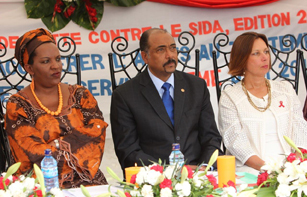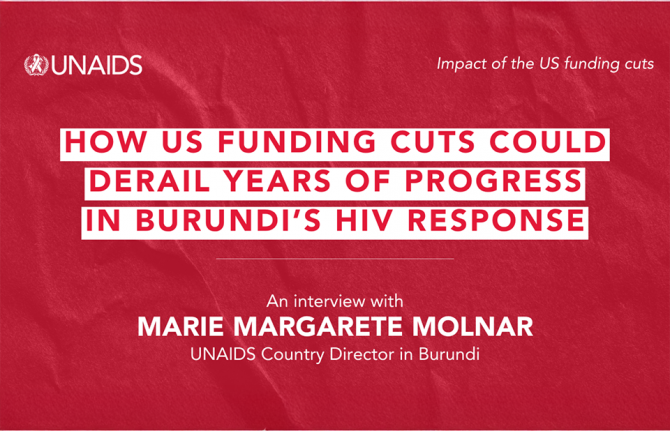
Feature Story
Burundi marks its National AIDS Day and commits to an AIDS-free generation
08 May 2013
08 May 2013 08 May 2013
L to R: Minister of Health of Burundi, Dr Sabine Ntakarutimana, UNAIDS Executive Director Michel Sidibé and United States Ambassador to Burundi, Dawn Liberi.
Burundi marked its National AIDS Day on 8 May and committed to stopping new HIV infections among children and keeping their mothers alive. The Minister of Health of Burundi, Dr Sabine Ntakarutimana who opened the event at the Kamenge health centre in Bujumbura said, “I am committed to bringing Burundi to zero new HIV infections, zero discrimination and zero AIDS-related deaths.”
Burundi’s health authorities report HIV prevalence in the country was 1.4% in 2010 with more than 98,000 people living with HIV in 2011. The country is struggling with a low HIV treatment coverage with only 49% of people eligible for antiretroviral therapy accessing it. Almost 2000 babies were born with HIV in 2011. The government has promised to improve treatment coverage especially for pregnant women living with HIV and recently Burundi’s President Pierre Nkurunziza adopted a decree which aims to significantly scale-up services to prevent new HIV infections among children.
I am committed to bringing Burundi to zero new HIV infections, zero discrimination and zero AIDS-related deaths.
Dr Sabine Ntakarutimana, Minister of Health
“AIDS is a strategic entry point for advancing Burundi’s social agenda at several levels: protecting women, children and human rights,” said UNAIDS Executive Director Michel Sidibé at the event.
The country will be receiving support for scaling-up services from the United States of America according to its Ambassador to the country, Dawn Liberi. “We will double our financial contribution to cover eight of the 17 provinces in Burundi with services to prevent new HIV infections among children,” she said.

Burundi’s Second Vice-President, Gervais Rufyikiri (left) and UNAIDS Executive Director Michel Sidibé.
In 2011, UNAIDS and partners launched the Global Plan towards the elimination of new HIV infections among children by 2015 and keeping their mothers alive. Burundi is one of the 22 countries that the Global Plan focuses on, where 90% of new HIV infections among children occur.
Mr Sidibé also visited the centre of health and family welfare (ABUBEF). The centre provides medical and care and support services to people living with HIV, as well as conducting HIV prevention programmes.
As part of his official visit to Burundi, Mr Sidibé met with the Second Vice-President, Gervais Rufyikiri, who has championed the country’s drive to stop new HIV infections in children. In 2005, Burundi emerged from a long civil war and the Vice-President asked UNAIDS to support the country’s efforts towards greater development. He said, “I am asking the international community to pay more attention to Burundi. We are in the process of rebuilding our country and we need your support.”
The UNAIDS Executive Director continues his official mission on 9 May with a meeting with the country’s president.



